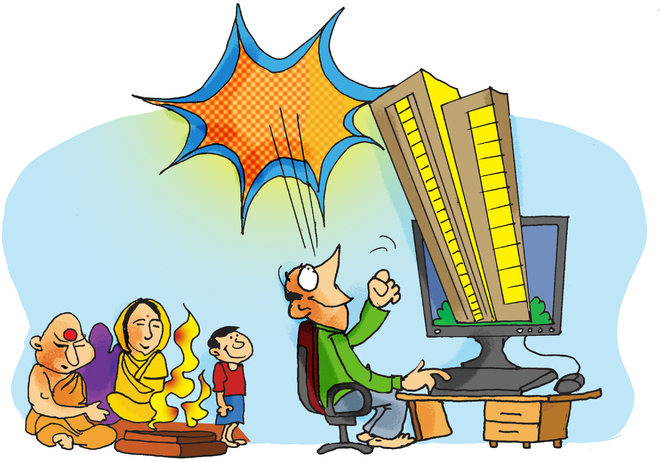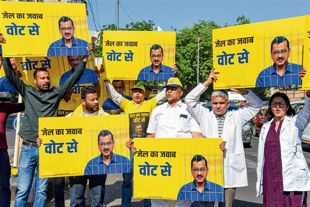
Illustration by Sandeep Joshi
Geetu Vaid
If you find it difficult to connect online flash sales and shopping festivals with real estate purchase, then it is time to readjust your antennae as for several home buyers in the country picking up a house online is no virtual reality any longer.
Genesis of a trend
A lot of eyebrows were raised and doubts expressed when over 50 apartments were claimed to have been sold by a leading developer during the Google Online Shopping Festival almost 18 months back, but the trend seems to be on a firm footing now as within a span of a month there have been two major campaigns to sell properties online. In June end there was a four-day Indian Realty Flash Sale (IRFS) organised by Amura Marketing Technologies and 99acres.com that showcased properties from 51 developers. And from July 18 onwards Magicbricks.com along with Group M Worldwide Inc, a media investment firm, and Google India Pvt. Ltd, is hosting a 10-day online property festival — Great Online Home Festival, or GOHF (www.gohf.magicbricks.com). GOHF is expected to have properties worth over Rs3,000 crore on offer. Apart from these a number of developers have worked out individual tie-ups with real estate portals as well as e-commerce platforms like Snapdeal and brokerage firms to offer properties online. Tata Housing Development Company, Mantri Developers, Mumbai-based developer Rustomjee Group, Lodha group, Godrej Properties, have been selling residential units online through these platforms for over a year and a half no, while the latest to join the club is Wave Infratech that has worked out an arrangment with Snapdeal and Housing.com for its different properties. Wave City Center and Wave City products will be available for sale on Snapdeal.com and Housing.com while it will be a part of Snapdeal’s NRI sale campaign.
Encouraging response
According to the developers the customer response has been encouraging going by the response to the flash sales. The recent IRFS saw around 14,900 offer coupon downloads while over 20,000 registrations had been reported before the sale opened. According to Vikram Kotnis, Managing Director of Amura Marketing Technologies Ltd, at least 15-20 per cent of the downloads were likely to be converted into actual sales. Tata Housing has also had a good run on sale front with over 1500 units sold online so far. Commenting on the group’s online journey Brotin Banerjee, CEO and MD, Tata Housing Development, says, “The company began selling houses online through Great Online Shopping Festival in December 2013 and soon after that it launched its flagship online property National Home Buying Day. These along with two partnerships and the launch of its own website, have resulted in Tata Housing listing all its projects online spanning affordable, premium and luxury”. Very recently, Tata Housing launched an integrated payment gateway to allow customers to make their entire home purchase online.
Online property purchase and search has also emerged as a good way to connect with NRI buyers as all the assistance needed to book the property, to complete documentation can be facilitated through this route. “NRIs have been strong evangelists of the online platform with 25 percent of buyers (between January-October 2014) being from the international markets of the United States of America, United Kingdom, the United Arab Emirates, South Africa, Malaysia, Singapore, Hong Kong and Australia. The participation from this segment has seen a tremendous surge, from a 12 per cent contribution to online sales in 2013 to 25 per cent in 2014”, says Brotin Banerjee.
The add on factor
While one of the biggest advantages of an online purchase is its convenience and freedom from middlemen and brokers. Discounts offered by some of the developers add icing to the cake. For one the commission of online sellers are less than those of offline sellers and then developers , too, can transfer their marketing cost margins to the buyers, which can be between 6-12 per cent. With a growing inventory overhang a lot of developers are putting their unsold stock on online platforms for sale with attractive discount options.
So, if you are buying in a flash sale or a housing festival then you can pocket substantial discounts in price. For instance in the IRFS Pune-based group offered a discount of Rs57 lakh on a Rs4.17 crore 4-BHK apartment, while Hiranandani Constructions waived off floor rise. Customers looking for Wave Infratech properties can book a property by paying a booking fee of only Rs30,000 on Snapdeal.com and can avail exclusive offers as well.
However, most of the discounts are not clear cut reduction of price but can be in the form of free stamp duty and registration, free second parking, fully furnished homes at no extra cost.
Are Tier II and II cities on board?
While most of these transactions have taken place in major metros, developers feels that it is only a matter of time before buyers in Tier II and III towns would also take this route to buy property. “With rapid growth in social and economic developments in cities like Chandigarh, Mohali, Patiala and cities in Haryana other than Gurgaon, these cities are becoming hot favorites not only for NRIs but also property buyers living in metros looking for investment options. On the other hand, online property portals are expanding their operations in these cities so as to provide home buyers with multiple investment options with the use of technology”, says Biswaroop Padhi, Principal Partner & Co-Founder, Square Yards .
“With states like Punjab and Haryana having more young working professionals who are in their late 20s and 30s looking to buy properties the online space will receive a lot of traction there”, says Sumit Ghosh, Chief Marketing Officer, Hero Homes. The group is in talks with suitable partners for online selling. “We’re looking to use the online buying space for both Haridwar and Ludhiana properties, and for all our future projects”, adds Ghosh.
But all developers are not in complete agreement as they feel that Indian buyers are not likely to spend over Rs50 lakh on a property without physically visiting it. “Although, online marketing provides to be a great support tool for real estate sale actual buying has not picked up much in this region as yet”, says Prateek Mittal, Executive Director, of Tricity-based Sushma Buildtech Ltd.
Also a big budget purchase like real estate can never an impluse decision, so essential aspects of real estate buying like site visits, sample flat survey and construction progress report will always be an handicap online, and will require physical intervention. “Online sale will not be able to completely eliminate the physical process from the purchase, any time soon.”, adds Mittal of Sushma Buildtech.
A word of caution
Online search for properties is vastly popular now all over the country as a majority of buyers access real estate portals and developers’ sites to carry out search and shortlisting before making the final decision. However, for those adopting the online route till the last stage the need for due diligence is all the more important. Pointing out the risk areas Amit Modi, Vice-President CREDAI Western UP and Wholetime Director ABA Corp., says, “The most important is authenticity of a developer and his project. Lack of authentic information is the biggest problem buyers face because sometimes some vital facts about the project or developer are not made clear”.
“The only flip side of online purchasing is there is a possibility of mis-representation of facts since the buyer is not actually physically viewing the project. So there could be possibilities that the information put up online by the sellers may not be true”, Girish Shah, Chief Marketing Officer, Godrej Properties Limited .
Moreover, a lot of developers tend to change their payment schedules after accepting the token money, so customers have to be careful about this.
Over enthusiasm also has to be curbed as if you don’t convert the online booking within a specified period then the token money, which can be anywhere between 20,000 to 1 lakh will be forfeited by the developer.
Thus, online selling though at a nascent stage is definitely the future, that Indian consumer is getting comfortable with.



























